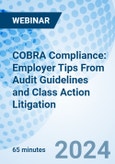Understand the risks associated with COBRA compliance and the most common mistakes made.
The Consolidated Omnibus Budget Reconciliation Act of 1985 (COBRA) requires employers’ group health plans to provide certain employees and their family members the right to temporarily continue health coverage under the plan at group rates. This topic will help you comply with COBRA by understanding which of your employees are eligible for COBRA rights when they become eligible for COBRA and what happens if an employee elects COBRA continuation coverage. Further, COBRA has significant penalties associated with non-compliance including the threat of damages from successful litigation. Recent years have seen a barrage of COBRA litigation including class action lawsuits alleging that group health plan continuation coverage election notices (required by COBRA), are deficient in one or more respects. While this litigation may sometimes seem trivial, courts have been reticent to dispose of them in a summary manner, e.g., by failing to certify the class. Once a class is certified, a defendant company faces the prospect of a long and costly defense. In March 2012, the IRS released a publication titled ‘Audit Techniques and Tax Law to Examine COBRA Cases.’ This publication signifies increased audit activity on COBRA compliance and can also be utilized as a tool to ensure COBRA compliance. COBRA compliance is complicated and places much risk on employers who cannot ensure they are compliant. This topic is necessary to help employers understand the risks associated with COBRA compliance, what it means to be compliant with COBRA, the most common mistakes that are made, and how to avoid litigation and IRS audits by ensuring compliance
Learning Objectives
- You will be able to discuss Employer COBRA requirements including the notice and timing requirements that make COBRA compliance so complicated.
- You will be able to explain how to use the IRS COBRA Audit Guidelines as a preemptive strike to audit and to self-audit to ensure compliance.
- You will be able to identify multiple courses of action that can be utilized to ensure COBRA compliance and avoid COBRA litigation.
- You will be able to review the penalties that can apply for failure to comply with COBRA including all the damages possible following successful litigation.
Agenda
Common COBRA Compliance Issues
- Notice Requirements
- Timing Requirements
- Why Is It So Easy to Make Mistakes?
COBRA Penalties
- What Are the Penalties?
- What Is Recoverable?
- What If a Participant Is Improperly Denied COBRA Coverage?
IRS COBRA Audits and Guidelines
- IRS 2012 Audit Guidelines
- Updates to the Audit Guidelines
- IRS COBRA Audit Initiative
Recent COBRA Litigation
- Different Types of Cobra-Related Litigation
- Important Recent Cases
- Lessons to Learn/How to Avoid Class Action Litigation
Employer Tips to Avoid COBRA Litigation or an IRS Audit
- Compliance Tips
- Self-Audit
- How to Avoid Litigation
Speakers

Linda Stuessi,
The Wagner Law Group- Of Counsel in the San Diego office of The Wagner Law Group
- Leads the retiree medical trust practice group at Wagner Law Group
- Practice includes drafting various trust documents, conducting research on legal issues in employee benefits law and tax law, coordinating with trust advisors, reviewing contracts with service providers, and preparing IRS requests for private letter rulings defending Department of Labor investigations
- Has practiced in ERISA and employee benefits for over 16 years, with prior experience in employment law, First Amendment law, securities class actions, and litigation
- J.D. degree, cum laude, University of Wisconsin Law School

Dannae L. Delano,
The Wagner Law Group- Partner in the St. Louis office of The Wagner Law Group
- Practice emphasizes all aspects of employee benefit compliance, planning, design and implementation and resolution of applicable tax issues regarding same
- Conducts regular seminars and workshops on all aspects of employee benefit compliance, for retirement plans, health and welfare plans, and executive compensation planning
- Wrote several publications related to employee benefit compliance issues
- Can be contacted at 314-236-0065, ddelano@wagnerlawgroup.com or www.wagnerlawgroup.com
Who Should Attend
This live webinar is designed for human resource and benefits professionals, payroll managers, business owners and managers, controllers, insurance professionals, and attorneys.










